The Old Stories, Updated With G-Strings
There is much to cheer about in the Metropolitan Opera’s phantasmagorical new production of Offenbach’s “Contes d’Hoffmann” (“Tales of Hoffmann”), which opened on Thursday night.
The mezzo-soprano Ekaterna Gubanova as the Venetian courtesan Giulietta
As conceived, this production was to have featured the tenor Rolando Villazón as the poet, wild-eyed dreamer and delusional lover Hoffmann. When Mr. Villazón, in the midst of a vocal crisis, pulled out last spring, the young Maltese tenor Joseph Calleja, who had never sung this daunting role, accepted the assignment. On Thursday he gave his all, singing with ardor, stamina and poignant vocal colorings and winning a rousing ovation. There were technically shaky elements to his performance, and his focused, quick vibrato revealed every slight inaccuracy of pitch. Still, the insecurity actually befitted Mr. Calleja’s take on the character, laid bare emotionally.
The soprano Anna Netrebko may have disappointed her fans by deciding not to sing all four of Hoffmann’s love interests, as originally planned. But she was vocally lustrous, charismatic and wrenching as Antonia, the sickly and frustrated singer who has been warned that singing will lead to her death. She also made a captivating and tart Stella, the prima donna Hoffmann is smitten with.
And James Levine, in his first performance at the Met since losing some two months of work because of back surgery, received a prolonged ovation from a welcoming audience when he appeared in the pit. He then drew a supple and bewitching performance from the great Met orchestra.
Still, the post-premiere discussion will probably focus on the acclaimed director Bartlett Sher’s fantastical production. Mr. Sher proved himself to opera buffs with his sleek and charming 2006 production of Rossini’s “Barber of Seville,” in revival at the Met this season. “Hoffmann” is a far more challenging and elusive assignment.
For me, the staging is marred by moments of excess and busyness. And Mr. Sher may have done too much analysis of the work’s psychological subtexts. We get a little bit of everything in the stage imagery: pasty-faced characters out of a Kafka tale; waiters in bowler hats who could have stepped out of a Magritte painting; decadent, orgiastic Felliniesque scenes at the palace in Venice where the courtesan Giulietta presides; and more.
Yet Mr. Sher, working with the set designer Michael Yeargan and the costume designer Catherine Zuber, does get to the emotional core of the opera. This Hoffmann, dressed in a plain suit suggesting 1920s Eastern Europe, spends most of his days seated at a humdrum writing table, with a battered typewriter and a small desk lamp. That desk is where he belongs. At least that is the conviction of the Muse of Poetry, who in the guise of Nicklausse, Hoffmann’s devoted friend, follows him everywhere. The mezzo-soprano Kate Lindsey, singing with warmth and subtlety and looking alluringly androgynous, makes a trustworthy muse.
Luther’s tavern, next to the opera house where Stella is starring in “Don Giovanni,” is the only public place where Hoffmann is in his element. During the Prologue, egged on by the students who frequent the tavern and hang on his stories, Hoffmann sings an impish ballad about the dwarf Kleinzach, which Mr. Calleja dispatched with snappy energy and ringing top notes.
After the Prologue, during the next three acts, all flashbacks, Hoffmann tells the students the stories of his three disastrous romantic obsessions. Mr. Sher makes clear that these really are tall tales. Imagery and characters bleed from one story into the others. In the workshop of the eccentric inventor Spalanzani (the hearty tenor Mark Schowalter), where the guests assemble to see the demonstration of Olympia, his mechanical doll, voluptuous women dressed in nothing but G-strings and pasties wander through the audience. Two acts later they are seen again as occupants of the palace of the Venetian courtesan Giulietta.
It makes sense that Hoffmann’s stories would become jumbled in his mind, and in his telling. Still, the act featuring Olympia is quite a jumble. This mechanical doll is one of a whole product line of dolls, who strut about in garish ballet dresses. Some of the guests seem to have drifted in from “The Cabinet of Dr. Caligari.” The staging has style and wit, but it seems too busy, too much.
Ideally, Offenbach wanted one soprano to sing all four of Hoffmann’s love interests. Ms. Netrebko may have been wise to pass on Olympia. The role’s high-flying runs and roulades require a true, agile coloratura soprano, and this production has one in the petite Kathleen Kim, who excelled in Olympia’s showpiece aria, singing with pinpoint pitch, bright tone and impressive accuracy.
The mezzo-soprano Ekaterina Gubanova was a suitably dark-hued and sensual Giulietta, dressed incongruously in an 18th-century gown. The baritone Alan Held was husky-voiced, imposing and often chilling, portraying the four devilish villains who torment Hoffmann.
The tenor Alan Oke was delightful in four minor character roles, especially as Franz, the hapless servant in Antonia’s house who secretly longs to be a singer. (This was a far cry from his Met debut performance as Gandhi in Philip Glass’s “Satyagraha.”)
Whatever the vocal issues with Mr. Calleja’s Hoffmann, he withstood the pressure of singing this formidable role for the first time in a major new production at the Met, and saved the day. He needs to do more work with his voice, but he is a gifted and promising tenor.
There is an enormous controversy about the score of this opera. Offenbach died four months before the work’s 1881 premiere in Paris. None of the versions of the work that have appeared over the years, some of them corrupted, can be said to be authentic. I will have more to say on this question later. Mr. Levine, as is his prerogative, conducted a version that he and advisers at the Met fashioned from existing sources.
Whatever scholars of “Hoffmann” believe about the validity of the choices made here, the opera as presented had integrity and dramatic flow. If the production is not a revelation, the Met’s new “Hoffmann” is a musically gratifying and vividly theatrical staging of a haunting and, in its way, profound work.
And click here and here
There is much to cheer about in the Metropolitan Opera’s phantasmagorical new production of Offenbach’s “Contes d’Hoffmann” (“Tales of Hoffmann”), which opened on Thursday night.
The mezzo-soprano Ekaterna Gubanova as the Venetian courtesan Giulietta
As conceived, this production was to have featured the tenor Rolando Villazón as the poet, wild-eyed dreamer and delusional lover Hoffmann. When Mr. Villazón, in the midst of a vocal crisis, pulled out last spring, the young Maltese tenor Joseph Calleja, who had never sung this daunting role, accepted the assignment. On Thursday he gave his all, singing with ardor, stamina and poignant vocal colorings and winning a rousing ovation. There were technically shaky elements to his performance, and his focused, quick vibrato revealed every slight inaccuracy of pitch. Still, the insecurity actually befitted Mr. Calleja’s take on the character, laid bare emotionally.
The soprano Anna Netrebko may have disappointed her fans by deciding not to sing all four of Hoffmann’s love interests, as originally planned. But she was vocally lustrous, charismatic and wrenching as Antonia, the sickly and frustrated singer who has been warned that singing will lead to her death. She also made a captivating and tart Stella, the prima donna Hoffmann is smitten with.
And James Levine, in his first performance at the Met since losing some two months of work because of back surgery, received a prolonged ovation from a welcoming audience when he appeared in the pit. He then drew a supple and bewitching performance from the great Met orchestra.
Still, the post-premiere discussion will probably focus on the acclaimed director Bartlett Sher’s fantastical production. Mr. Sher proved himself to opera buffs with his sleek and charming 2006 production of Rossini’s “Barber of Seville,” in revival at the Met this season. “Hoffmann” is a far more challenging and elusive assignment.
For me, the staging is marred by moments of excess and busyness. And Mr. Sher may have done too much analysis of the work’s psychological subtexts. We get a little bit of everything in the stage imagery: pasty-faced characters out of a Kafka tale; waiters in bowler hats who could have stepped out of a Magritte painting; decadent, orgiastic Felliniesque scenes at the palace in Venice where the courtesan Giulietta presides; and more.
Yet Mr. Sher, working with the set designer Michael Yeargan and the costume designer Catherine Zuber, does get to the emotional core of the opera. This Hoffmann, dressed in a plain suit suggesting 1920s Eastern Europe, spends most of his days seated at a humdrum writing table, with a battered typewriter and a small desk lamp. That desk is where he belongs. At least that is the conviction of the Muse of Poetry, who in the guise of Nicklausse, Hoffmann’s devoted friend, follows him everywhere. The mezzo-soprano Kate Lindsey, singing with warmth and subtlety and looking alluringly androgynous, makes a trustworthy muse.
Luther’s tavern, next to the opera house where Stella is starring in “Don Giovanni,” is the only public place where Hoffmann is in his element. During the Prologue, egged on by the students who frequent the tavern and hang on his stories, Hoffmann sings an impish ballad about the dwarf Kleinzach, which Mr. Calleja dispatched with snappy energy and ringing top notes.
After the Prologue, during the next three acts, all flashbacks, Hoffmann tells the students the stories of his three disastrous romantic obsessions. Mr. Sher makes clear that these really are tall tales. Imagery and characters bleed from one story into the others. In the workshop of the eccentric inventor Spalanzani (the hearty tenor Mark Schowalter), where the guests assemble to see the demonstration of Olympia, his mechanical doll, voluptuous women dressed in nothing but G-strings and pasties wander through the audience. Two acts later they are seen again as occupants of the palace of the Venetian courtesan Giulietta.
It makes sense that Hoffmann’s stories would become jumbled in his mind, and in his telling. Still, the act featuring Olympia is quite a jumble. This mechanical doll is one of a whole product line of dolls, who strut about in garish ballet dresses. Some of the guests seem to have drifted in from “The Cabinet of Dr. Caligari.” The staging has style and wit, but it seems too busy, too much.
Ideally, Offenbach wanted one soprano to sing all four of Hoffmann’s love interests. Ms. Netrebko may have been wise to pass on Olympia. The role’s high-flying runs and roulades require a true, agile coloratura soprano, and this production has one in the petite Kathleen Kim, who excelled in Olympia’s showpiece aria, singing with pinpoint pitch, bright tone and impressive accuracy.
The mezzo-soprano Ekaterina Gubanova was a suitably dark-hued and sensual Giulietta, dressed incongruously in an 18th-century gown. The baritone Alan Held was husky-voiced, imposing and often chilling, portraying the four devilish villains who torment Hoffmann.
The tenor Alan Oke was delightful in four minor character roles, especially as Franz, the hapless servant in Antonia’s house who secretly longs to be a singer. (This was a far cry from his Met debut performance as Gandhi in Philip Glass’s “Satyagraha.”)
Whatever the vocal issues with Mr. Calleja’s Hoffmann, he withstood the pressure of singing this formidable role for the first time in a major new production at the Met, and saved the day. He needs to do more work with his voice, but he is a gifted and promising tenor.
There is an enormous controversy about the score of this opera. Offenbach died four months before the work’s 1881 premiere in Paris. None of the versions of the work that have appeared over the years, some of them corrupted, can be said to be authentic. I will have more to say on this question later. Mr. Levine, as is his prerogative, conducted a version that he and advisers at the Met fashioned from existing sources.
Whatever scholars of “Hoffmann” believe about the validity of the choices made here, the opera as presented had integrity and dramatic flow. If the production is not a revelation, the Met’s new “Hoffmann” is a musically gratifying and vividly theatrical staging of a haunting and, in its way, profound work.
And click here and here
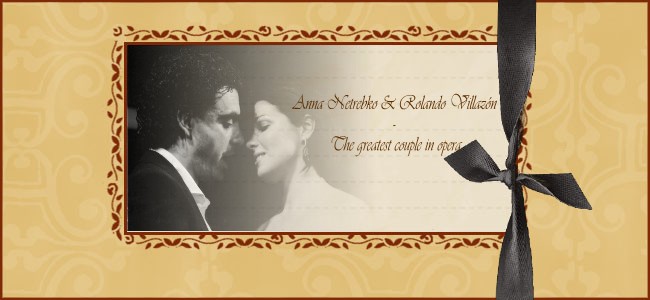

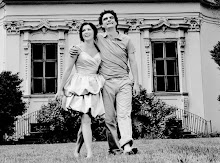
.jpg)

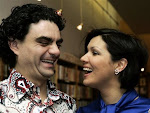

.jpg)

.jpg)


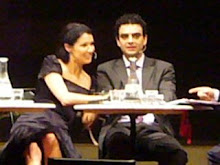.jpg)


.png)
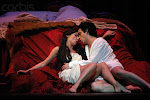


.jpg)
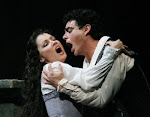.jpg)
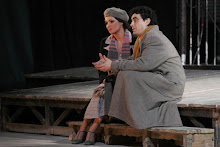.jpg)
.jpg)
.jpg)
.jpg)
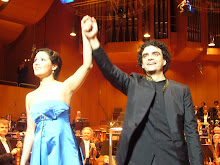.jpg)


.jpg)


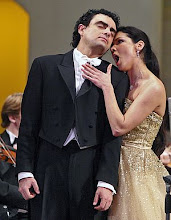.jpg)
.jpg)


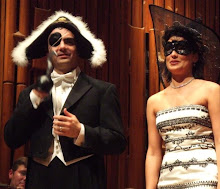


.jpg)
.jpg)

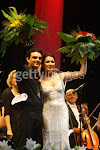
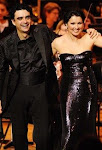.bmp)
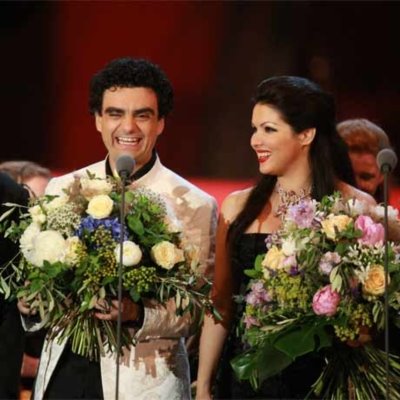
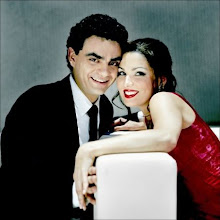
.jpg)

.jpg)




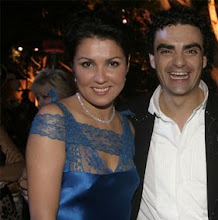+2.jpg)
.jpg)






















Keine Kommentare:
Kommentar veröffentlichen